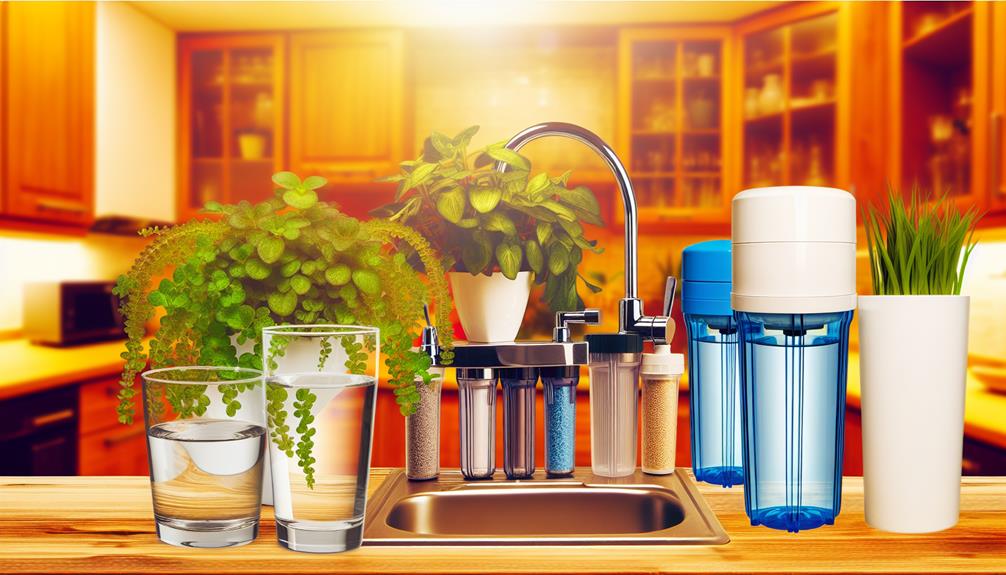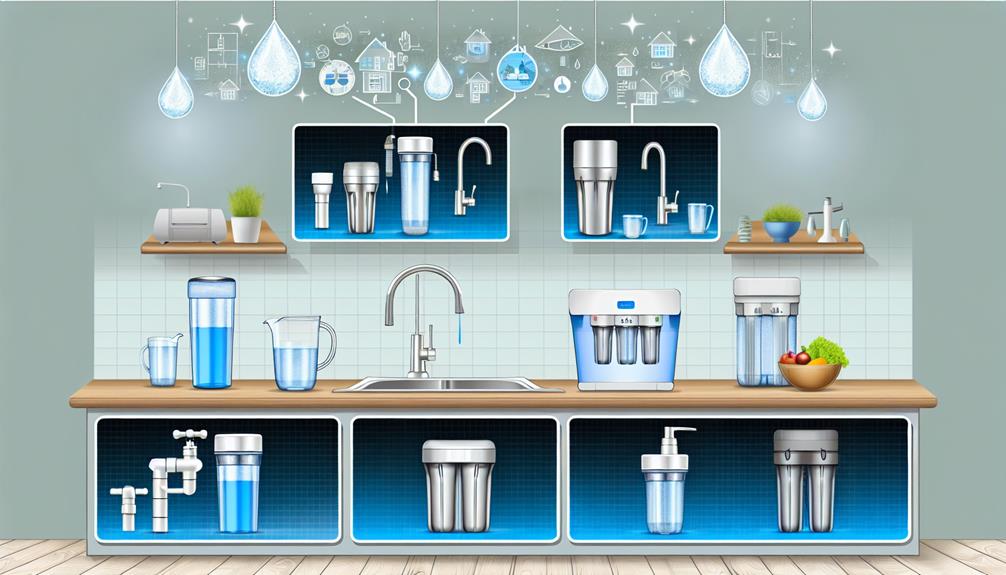When you're sourcing water treatment solutions, comparing reliability, efficiency, and sustainability is key.
As a professional looking for the best industrial reverse osmosis filter providers, you've likely encountered a range of options, each with their unique selling points and technical specifications.
It's crucial to navigate through this maze of information to pinpoint which systems offer the optimal balance between cutting-edge filtration performance and long-term cost-effectiveness.
With the right provider, you can ensure not just compliance with industry standards, but also a robust framework for scalability as your operations grow.
Stay tuned as we sift through the critical factors that will guide you towards making an informed decision that aligns with your company's specific needs and goals.
Evaluating Filtration Performance
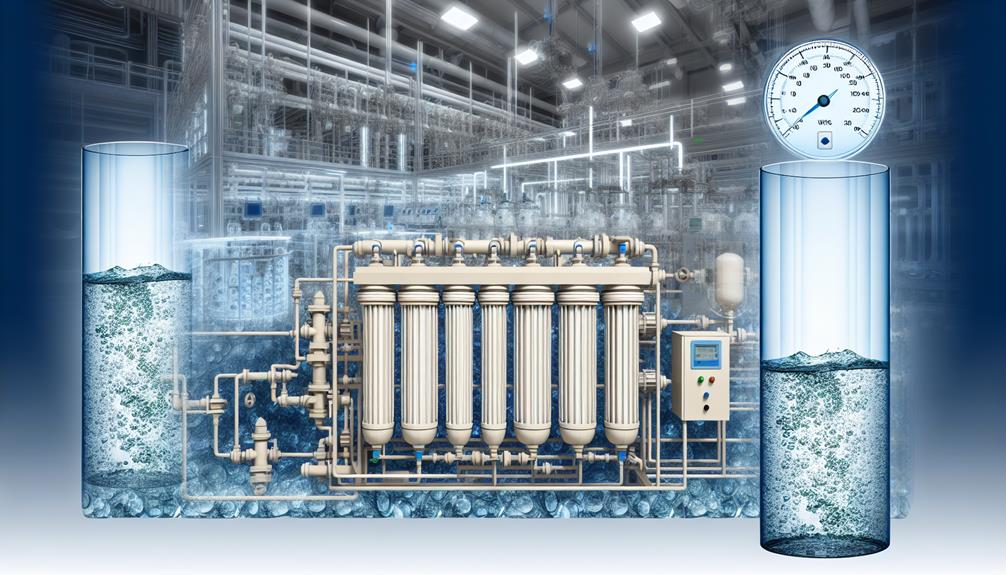
To accurately assess an industrial reverse osmosis filter's efficacy, you'll need to analyze its performance metrics, such as permeate flow and solute rejection rates. These are critical indicators of the filter's operational health and overall efficiency.
The permeate flow rate, often measured in gallons per minute (GPM), quantifies the volume of purified water produced. A decline in this rate can signal fouling or scaling, which impairs the filter's function.
Equally important is the solute rejection rate, which reflects the percentage of contaminant rejection. This metric is essential for ensuring the filter meets the required water purity standards. A high rejection rate indicates that the filter is effectively removing dissolved solids, organics, and other contaminants from the feedwater.
Monitoring the filter lifespan is also vital. Frequent replacements may indicate suboptimal operation or unsuitable filter selection for the given application. Remember, a shorter lifespan not only affects operational costs but could also compromise water quality.
Customization and Scalability Options
While considering industrial reverse osmosis systems, it's crucial to explore options for customization and scalability that align with your specific water treatment requirements and future expansion plans. The right provider won't just offer a one-size-fits-all solution; instead, they'll work with you to assess your needs and adapt their systems accordingly.
Top-tier providers will ensure their systems can be seamlessly integrated into your existing infrastructure. This system integration is vital to maintain operational efficiency and minimize downtime. Performance monitoring capabilities are also essential, enabling you to continually assess system effectiveness and make data-driven decisions.
Consider the following key elements for a tailored and future-proof reverse osmosis system:
- Modular design: Easily expandable units to increase capacity as demand grows.
- Interoperability: Compatible with existing systems and processes for a smooth integration.
- Custom membrane configurations: Tailored to remove specific contaminants from your water source.
- Advanced controls: For precise adjustments and real-time performance monitoring.
- Variable operation parameters: Adjustable pressure, flow rates, and recovery ratios to optimize efficiency.
Maintenance and Service Support
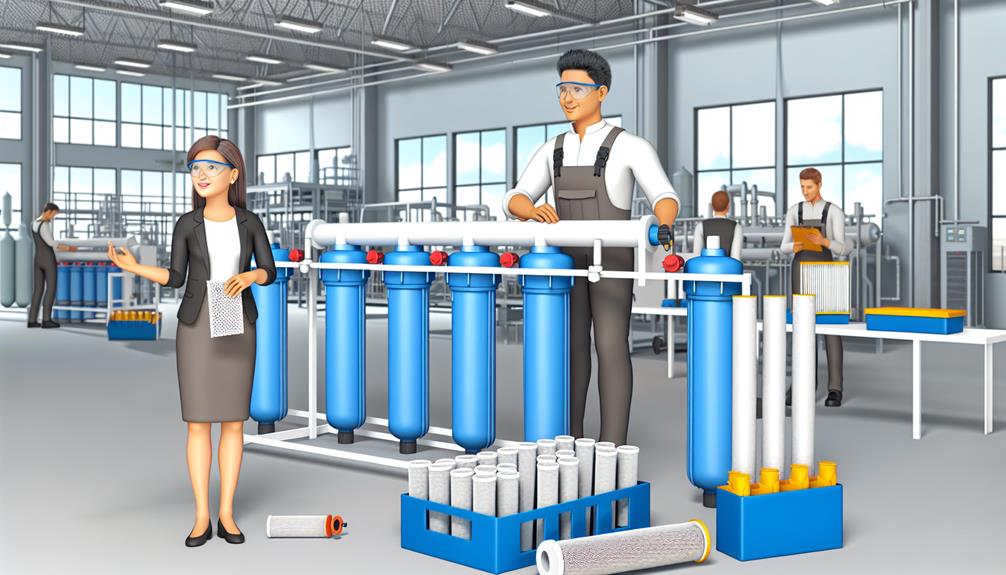
Beyond tailoring your reverse osmosis system for optimal integration and scalability, ensuring robust maintenance and service support is critical for long-term operational reliability. Top providers excel not only in the production of these systems but also in offering comprehensive service packages that monitor and maintain performance levels.
Your provider's commitment to systematic checks is pivotal. System monitoring is a cornerstone of proactive maintenance, enabling early detection of potential issues such as membrane fouling, scaling, or unexpected drops in permeate quality. By utilizing data analytics and predictive diagnostics, service teams can intervene before minor issues escalate into costly repairs or system downtime.
Equally important is the establishment of a well-planned replacement scheduling for consumables and critical components. This scheduling is based on historical performance data, water quality, and operational parameters, ensuring that replacements are timely and in alignment with your system's unique demands. Service support should include an inventory management strategy that prevents delays in sourcing spare parts and consumables, thus avoiding operational disruptions.
Engage with providers who demonstrate technical expertise and a detail-oriented approach to maintenance. They should be analytical in their assessment of your system's performance, offering tailored solutions that ensure the longevity and efficiency of your industrial reverse osmosis system.
Certifications and Compliance Standards
Ensuring that your industrial reverse osmosis filter system meets pertinent certifications and compliance standards is crucial for operational legitimacy and safety. Quality assurance and regulatory adherence aren't just checkboxes on a compliance sheet; they're essential factors that reflect the reliability and efficacy of your system.
As you evaluate providers, it's imperative to dissect their commitment to standards that govern water purification processes and equipment.
Pay close attention to these certifications and standards:
- ISO 9001: Demonstrates a provider's commitment to quality management principles.
- NSF/ANSI 61: Ensures products meet health effects requirements for materials that come into contact with drinking water.
- CE Marking: Signifies conformity with health, safety, and environmental protection standards for products sold within the European Economic Area.
- ASME Pressure Vessel Certification: Indicates compliance with the American Society of Mechanical Engineers' safety guidelines.
- UL Listing: Offers assurance that products have been tested to nationally recognized safety and sustainability standards.
When you're in the market for an industrial reverse osmosis filter system, don't overlook the importance of these certifications. They're not just formalities; they're assurances that the equipment you invest in is built and tested to meet strict industry standards, ensuring the safety of your operations and the quality of the output water.
Cost-Benefit Analysis
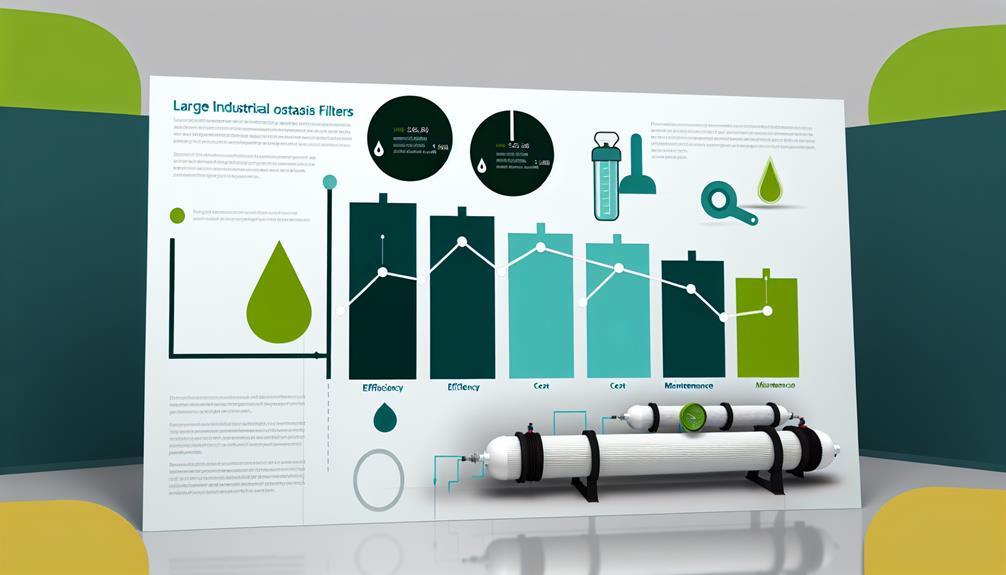
Recognizing the importance of certifications and compliance in safeguarding your operations, you must also weigh the financial implications of acquiring an industrial reverse osmosis filter system through a thorough cost-benefit analysis.
Initially, this requires a detailed consideration of installation expenses. The upfront cost encompasses not only the purchase price but also any modifications to existing infrastructure and potential downtime during implementation.
Moreover, energy efficiency plays a pivotal role in long-term cost savings. Reverse osmosis systems consume power to operate high-pressure pumps necessary for the filtration process. Selecting a system with optimized energy consumption can significantly reduce operational costs over time.
You should meticulously evaluate the energy ratings and performance metrics of different systems, considering the total energy expenditure relative to the volume of purified water produced.
Conclusion
In concluding, you must balance filtration efficacy, customization, scalability, and support against cost. Seek providers with proven performance, robust certification, and compliance track records. Don't compromise on maintenance and service quality—these are crucial for long-term reliability.
Conduct a thorough cost-benefit analysis to ensure your investment aligns with operational goals. The right industrial reverse osmosis filter provider isn't just a vendor; they're a strategic partner in your process efficiency and water purity objectives.
Choose wisely.
